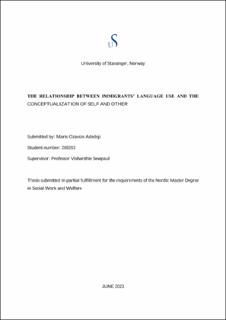| dc.description.abstract | ABSTRACT
In Norway, hegemonic discourses on African immigrants reflect global dominant discourses on migrants, with negative constructions and projections of African migrants as poor, inferior and uneducated. These discriminatory and racialized conceptualizations, which negatively impact the conceptualization of self are exacerbated by the media and incite right-wing populist ideology. Though the Norwegian government has a holistic immigration and integration policy, these hegemonic conceptualizations may trump policy in-day-to-day practice. In investigating the phenomenon under study, the research used phenomenology and social constructionism as philosophical positions to explore and understand the lived experiences of participants in the project. Qualitative research was the method of inquiry and in-depth semi structured interviews were used for data collection while thematic analysis with an inductive approach and critical discourse analysis CDA were methods used to analyze the data. The data were collected from seven participants of African descent. The major findings of the research were that participants disarticulated themselves from dominant discourses on immigrants using resistance and positive reframing as agency to counter hegemonic constructions, perceptions, and categorization of African immigrants. Appropriate policy and practice recommendations, and recommendations for further research are made based on the conclusions drawn from the study. | |
